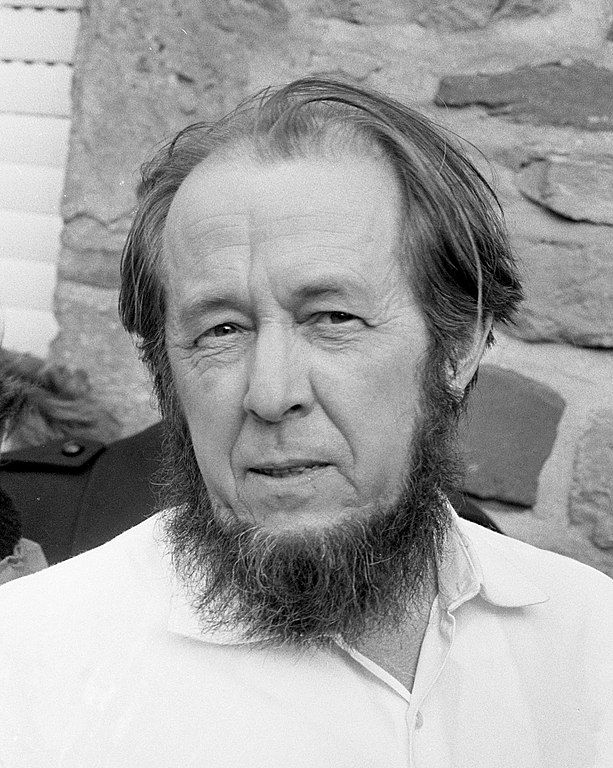Alexander Solzhenitsyn – A summary
Alexander Solzhenitsyn (1918–2008) was a Russian novelist, historian, and outspoken critic of Soviet totalitarianism. He is best known for his works that exposed the horrors of the Soviet labor camp system, known as the Gulag. Solzhenitsyn’s writings brought him international acclaim, but also led to his persecution by the Soviet authorities. He was awarded the Nobel Prize in Literature in 1970 and is considered one of the most influential writers of the 20th century.
Popular Books:
- One Day in the Life of Ivan Denisovich (1962)
- This novella, based on Solzhenitsyn’s own experiences, depicts a single day in the life of a prisoner in a Soviet labor camp. It was the first published work to openly describe the Gulag system and marked a turning point in Soviet literature.
2. The Gulag Archipelago (1973)
- A monumental three-volume work, it is a detailed and harrowing account of the Soviet labor camp system. Combining historical analysis, personal testimony, and literary narrative, it exposed the scale of Soviet repression and became a symbol of resistance to totalitarianism.
3. Cancer Ward (1968)
- This novel explores themes of mortality, human suffering, and the resilience of the human spirit through the experiences of patients in a Soviet cancer ward. It is also a critique of the Soviet system and its dehumanizing effects.
4. The First Circle (1968)
- Set in a special prison for scientists and intellectuals, the novel examines the moral dilemmas faced by individuals living under a repressive regime. It reflects Solzhenitsyn’s belief in the importance of intellectual and spiritual freedom.
5. August 1914 (1971)
- The first book in Solzhenitsyn’s historical series The Red Wheel, it focuses on the Russian defeat at the Battle of Tannenberg during World War I and critiques the incompetence of the Russian leadership.
6. Two Hundred Years Together (2001–2002)
- This two volume work examines the history of Jewish-Russian relations over two centuries. Solzhenitsyn explores the complex and often fraught interactions between Jews and Russians, addressing themes of coexistence, assimilation and conflict.
Notable Quotes:
- “The line separating good and evil passes not through states, nor between classes, nor between political parties either but right through every human heart.”
(From The Gulag Archipelago) - “Live not by lies.”
(From his 1974 essay urging individuals to resist the falsehoods of totalitarianism.) - “Own only what you can always carry with you: know languages, know countries, know people. Let your memory be your travel bag.”
(From The Gulag Archipelago) - “The simple step of a courageous individual is not to take part in the lie.”
(From his 1974 essay.)
Core Beliefs:
- Opposition to Totalitarianism:
Solzhenitsyn was a fierce critic of both Soviet communism and Western materialism. He believed that totalitarianism, in any form, dehumanizes individuals and destroys moral and spiritual values. - Moral and Spiritual Integrity:
He emphasized the importance of personal responsibility, truth, and moral courage. His works often explore the struggle to maintain one’s humanity in the face of oppression. - Faith and Tradition:
Solzhenitsyn was a devout Russian Orthodox Christian and believed that spiritual and cultural traditions were essential for preserving human dignity and resisting tyranny. - Critique of the West:
While he admired the freedoms of the West, he criticized its materialism, consumerism, and loss of spiritual values, which he saw as a different kind of moral decay. - Russian Nationalism:
Solzhenitsyn was a patriot who believed in the unique spiritual and cultural mission of Russia. However, he also criticized the Russian state for its historical injustices and failures.
Legacy:
Alexander Solzhenitsyn’s works remain a powerful testament to the resilience of the human spirit in the face of oppression. His courage in exposing the truth about the Soviet regime inspired dissidents worldwide and continues to resonate as a warning against the dangers of totalitarianism and the erosion of moral values. Two Hundred Years Together, though controversial, adds to his legacy as a historian unafraid to tackle complex and sensitive topics in Russian history.


